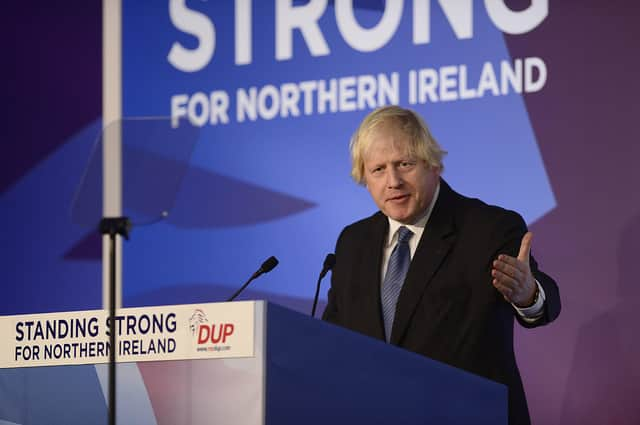Owen Polley: There is no guarantee that a new prime minister would be better for Northern Ireland than Boris Johnson


The prime minister is reportedly plotting a comeback that involves relaxing Covid regulations, but his position is still in doubt.
A senior civil servant, Sue Gray, is investigating a number of events held at Number 10 Downing Street, to establish whether Covid rules were broken.
Advertisement
Hide AdAdvertisement
Hide AdIf that was not enough, the prime minister is also accused of withholding information about the refurbishment of his flat from the government’s ‘ethics tsar’, Lord Geidt.
Conservative MPs are said to be losing faith in Mr Johnson, as he is linked ever more frequently to allegations of dishonesty and sleaze.
These incidents raise important questions about the prime minister’s character and integrity that are relevant to whether he is the sort of person who should lead the country.
Yet, in isolation, none of them are politically significant. They may reveal hypocrisy and lack of judgement, but they affect people’s lives only obliquely.
Advertisement
Hide AdAdvertisement
Hide AdIn contrast, Mr Johnson’s casual attitude to the truth has had a very direct impact on Northern Ireland.
Many of us remember vividly his claim at the DUP’s annual conference that, “No British government could or should agree to regulatory checks or customs controls between Great Britain and Ulster.”
A little more than a year later, Boris signed the Northern Ireland Protocol, which placed exactly this type of economic border in the Irish Sea.
To make things worse, rather than provide an explanation for this u-turn, the prime minister simply denied that his Brexit deal involved any economic barriers.
Advertisement
Hide AdAdvertisement
Hide AdMr Johnson told a meeting of Conservatives in Belfast, “I speak as the prime minister of the United Kingdom and a passionate unionist — there will not be checks on goods going from Northern Ireland to Great Britain. We’re the government of the United Kingdom and we will not institute or implement such checks.”
Very early in his premiership, then, people in Northern Ireland got a brutal lesson in Boris’s brazen, careless style of leadership.
With that experience in mind, should we cheer on his opponents as they try to force the prime minister to resign, in the hope that an alternative Conservative leader would be more reliable?
Unfortunately, we cannot be confident that Johnson’s successor would repair the damage caused by the protocol or nurture the Union any more successfully. While Boris’s attitude to Northern Ireland, when Brexit was in sight, was at best cavalier, less bullish colleagues in the Conservative party were equally irresponsible.
Advertisement
Hide AdAdvertisement
Hide AdTheresa May used references to the Belfast Agreement and the ‘peace process’ to try to sell her withdrawal agreement to fellow Tories. Rather than argue the merits of her proposed deal, which kept the whole of the UK tied closely to the single market and customs union, she disguised its true intentions by describing it as an ‘insurance policy’ for Northern Ireland.
Meanwhile, outwardly europhile Tories, indeed europhiles from all the national parties, used Northern Ireland ruthlessly as a pretext to try to scupper any form of Brexit. This strategy often involved embracing an alarmingly nationalist interpretation of Irish history.
“There’s one thing you need to know about the Troubles in Ireland,” claimed one-time Tory leadership hopeful, Rory Stewart, “and that’s that the Troubles, the nationalism (sic) began with borders. And the Troubles were ended by the removal of this border through the Good Friday Agreement.”
It’s a cliche to describe our province as a pawn in a larger political chess game, but in this case, it was a telling analogy that could be levelled at every side.
Advertisement
Hide AdAdvertisement
Hide AdIf the Conservatives get rid of Boris Johnson, or if he resigns, it is very unclear who would become the next prime minister.
One of the likely challengers, Rishi Sunak, reportedly wants a better relationship with the EU and is sceptical about fighting hard to remove the protocol. He apparently opposed the idea of triggering Article 16 to suspend checks in the Irish Sea before Christmas.
Another potential candidate, Liz Truss, is currently in charge of the negotiations with Brussels. If she were to restore Northern Ireland’s integral role in the UK’s economy, then she would be a formidable contender. But she is relatively unproven, having built her reputation on closing trade deals that were already well progressed.
Boris Johnson is viewed as untrustworthy, but he is committed, at least in theory, to removing the worst aspects of the protocol. That theoretical commitment has not been worth much, but he could be replaced by a Conservative who is prepared to openly accept the Irish Sea border.
Advertisement
Hide AdAdvertisement
Hide AdUnionists badly want a PM who is committed to the Union, alert to republican deception and interested in Northern Ireland. Boris Johnson has not met that description, but there is no guarantee that his successor would be any better.
——— ———
A message from the Editor:
Thank you for reading this story on our website. While I have your attention, I also have an important request to make of you.
With the coronavirus lockdowns having had a major impact on many of our advertisers — and consequently the revenue we receive — we are more reliant than ever on you taking out a digital subscription.
Subscribe to newsletter.co.uk and enjoy unlimited access to the best Northern Ireland and UK news and information online and on our app. With a digital subscription, you can read more than 5 articles, see fewer ads, enjoy faster load times, and get access to exclusive newsletters and content.
Visit
now to sign up.
Advertisement
Hide AdAdvertisement
Hide AdOur journalism costs money and we rely on advertising, print and digital revenues to help to support them. By supporting us, we are able to support you in providing trusted, fact-checked content for this website.
Ben Lowry, Editor